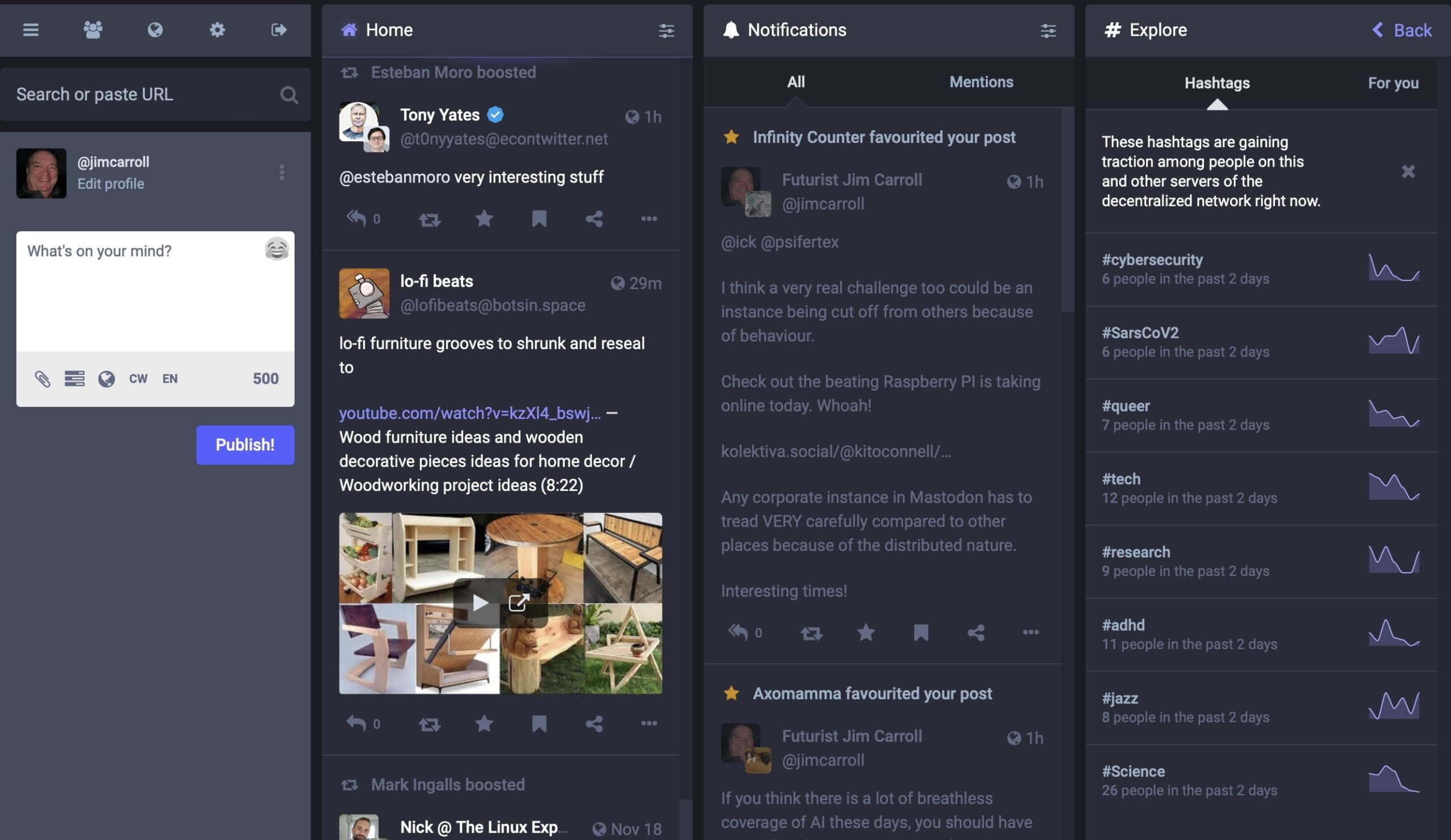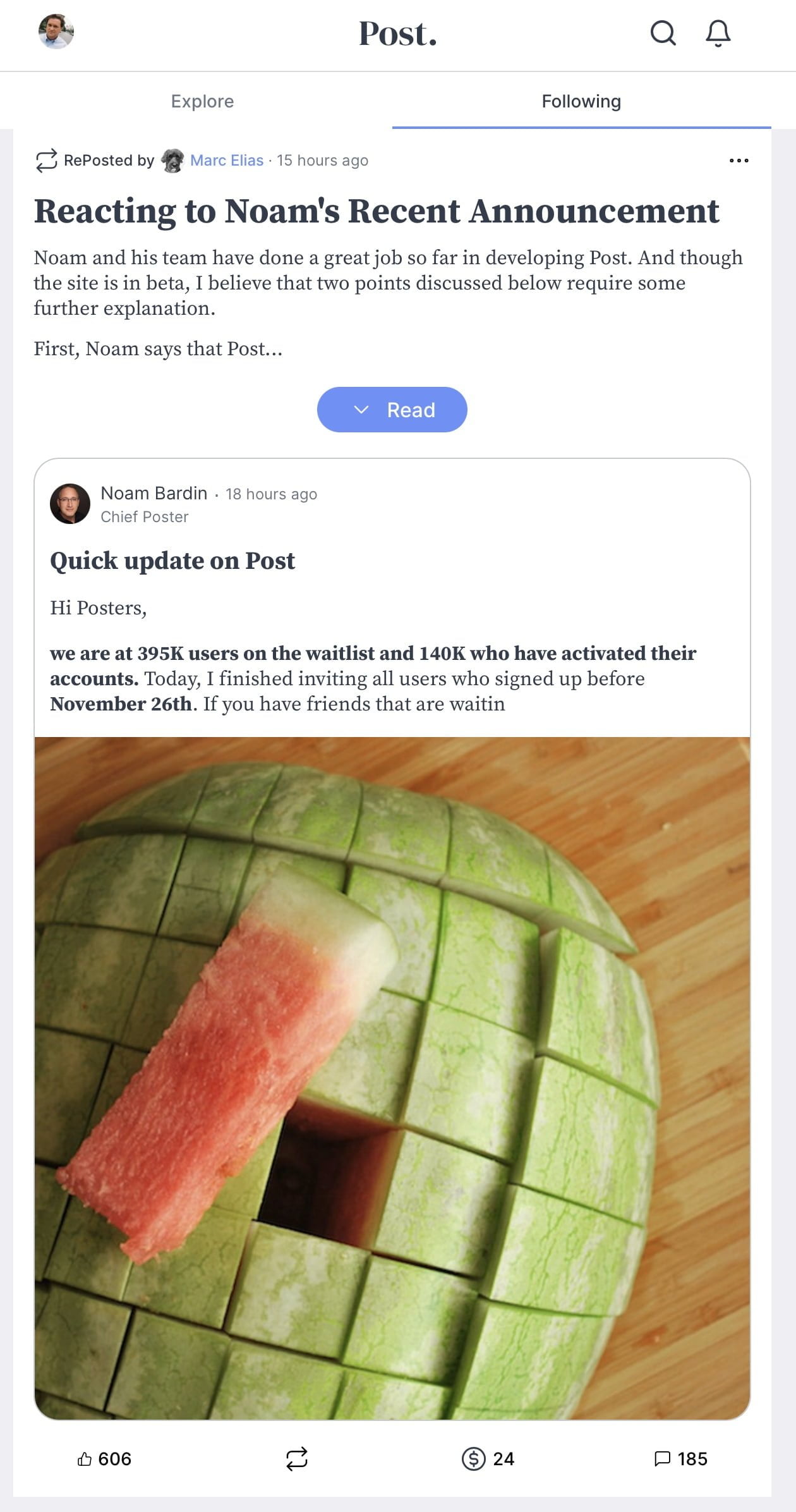You would have had to be living under a rock for the last month to miss all the drama around Elon Musk and his purchase of Twitter. The headlines are breathless; the coverage is relentless; the level of shock with many is astounding.
But what does it all mean?
No one really knows. And that might have major implications for world politics, business organizations, and hundreds of millions of people!
As someone who has been online for 40 years – I sent my first email in 1982 and was on the Internet for a decade before it exploded into public consciousness – and as someone who watches fast-moving trends that impact the future – I had to immerse myself into this story.
I started out by actively scaling back my Twitter usage and getting aggressively involved in two potential alternatives – at the same time that I’ve been watching unfolding events each and every day like I was watching a potential train wreck. I posted this to Twitter the day I decided to scale back.

Here’s my quick overview of what is going on.
What are his plans?
Perhaps the biggest question has to do with – why did he do it. What are his plans? Why did he buy Twitter?
Beyond this being the ultimate ‘impulse purchase,’ it is pretty clear that he did so with some big goals in mind. Like many in the tech community, Elon Musk always thought that so much more could be done with Twitter; it really is a rather limited technology platform, both in scope and capability as well as reach. Facebook has several billion active users; Twitter, but a few hundred million.
You can’t do too much on it, really. And it is, for its active user base, rather small. Yet its influence – in the world of business, politics, the arts, and more – has a massive influencing presence.
Beyond that, though, Musk sees something else – a foundation for a WeChat type of service.
WeChat? It’s best understood in a stunning New York Times video that documents how it has become known as ‘the everything app’ – in that it essentially lets you do everything and anything. You really need to watch this video to understand how important this app is in China.
Essentially, with over 1 billion users, you realize that it truly is an ‘everything app.’ People use it to buy things from stores established on the app or to reach customer support through it. Others create their own stores on the app or other forms of service-oriented business. Hundreds of millions do their shopping, banking, news reading, holiday planning, marketing, chatting, and emailing – virtually everything and anything is done through WeChat.
This is what Elon Musk wants to do with Twitter – he wants to turn it into an everything app. He’s recently tried to put a spotlight on these goals by talking about what he refers to as Twitter 2.0.
The big question is whether he has enough time to pull this off.
What happens now?
Pretty much anyone with a Twitter account is watching things unfold at a blistering pace – it’s been a wild month.!
But here is what we know so far.
First off, Twitter is in a precarious financial position. It is drowning in debt, advertisers are fleeing, and a chaotic environment is doing little to instill confidence in its actions by Musk. It has become the center of a massive debate between left and right. There is no doubt that it is witnessing an alarming rate of growth with spam, hate crime, harassment, and other significant problems.
But the big question everyone is asking is – in the midst of all this, might Twitter actually collapse?
The jury seems to be out on this. Some tech people are suggesting that a collapse could be imminent, while others suggest that it could chug along with a minor hiccup here and there. What we do know is that it is a massively complex system and that massively complex systems can suddenly teeter and totter literally, overnight. The best guidance might come from what happened in my home country of Canada earlier this summer – when a single software upgrade managed to bring down the cellular phone, Internet, and TV access for more than ten million Canadians.
Let that sink in – one small bit of code collapses an entire multi-billion network in seconds, and it took days for the company to restore services to everyone.
That is one real potential outcome.
Will Twitter Run into Other Problems?
But if that were not to happen, there are other big potential problems.
I made a comment to someone the other day on this very question, noting that ‘hell hath no fury as a regulator scorned.’ I was suggesting that even if Twitter were not to collapse, it would most definitely run afoul of various national laws having to do with hate material, content moderation, child pornography, and other complex challenges.
Literally hours after I made this comment, the key regulator for the European Commission warned Musk that he had better take content moderation on the service more seriously, or it could be banned in Europe.
So what really happens? This content moderation issue is one that needs to be watched.
Certain things are known – Elon Musk has fired or downsized all the staff that managed the posting of problematic information to the site. The result? Massive acceleration of problematic information. That won’t sit well with the regulators.
Second, it is becoming rapidly apparent that many automated systems are no longer working, are starting to fail, and are proving to be effective. This means that it might not go out in a spectacular blaze of glory, but might simply die the ‘death of a thousand cuts.’ Or, maybe not. This is what happens with complex computer systems when you fire the people who run, manage and maintain the complex systems.
Third, it is apparent that the disappearance of this automated system is leading to opportunities for some very smart people to ‘game the system.’ The latest news is that far-right-wing activities have figured out how to use an automated loophole to see the instant banning of left-wing activists. There might be a war of attrition on the service, and it could end up looking more like far right-wing services like Gab or 4Chan.
Fourth, it is apparent that with the disappearance of all content-moderation systems, Twitter is quickly running afoul of the laws of most nations and regions that have content-moderation laws. Something has got to give.
In the meantime, many advertisers have abandoned the service altogether. as have many users.
Does he have time? No one knows, to be honest!
Are there alternatives?
At this point, there seem to be two leading contenders as potential replacements for Twitter, and they could not be more different in terms of philosophy, direction, funding, and what is known as ‘technology architecture.
The first is known as Mastodon; the second is Post. News.
Mastodon provides an experience that is very Twitter-like – in that there are followers who follow you and people you follow. What is fundamentally different is the technology behind Mastodon. Unlike Twitter, it’s not a company – it’s ‘open source software,’ much like Linux is. There isn’t’ one Mastodon service – there are lots and lots of them. You join Mastodon by joining a Mastodon instance, and from there, can begin to become a part of the ‘fediverse,’ as the global Mastodon world is known. I’m on there, having established my own Mastodon server, as jimcarroll@futurist.info . The key thing about Mastodon – it’s not Twitter! It’s friendly, opening, and welcoming – if you take the time to understand it!

Mastodon has an appearance very much like your use of Twitter. It is so much different though!

The second leading alternative is Post. News, established by Noam Bardin, founder of Waze. It seems to be quickly becoming a home for news reporters, influencers, and other high-profile people who are eager to abandon Twitter. It is well-financed and has ambitious goals to support upwards of 50 million users within but a few months. I’m on there as @jimcarroll
Post.News at this time just has one long scrolling feed ; I don’t see the same type of unique welcoming online culture there.

With both of these systems, some people are going all in, shutting down their Twitter accounts completely. others are taking careful steps into the new world while still glancing at their Twitter timeline.
In my case, I’m playing a waiting game, watching carefully. I’m posting my Daily Inspiration to Twitter; that’s about it. I do peek at it every once in a while, and the posts do seem to be becoming actively more toxic.
What are the implications?
In the context of all these fast-moving events, we need to keep in mind that Twitter is an important global infrastructure.
We know that it has a profound impact on politics, governance, activism, and more – and this has now been thrown into turmoil.
We know that it has a massive role in government, public safety institutions, and others. Twitter has become a backbone for fast information distribution during floods, earthquakes, civil unrest, and other disasters.
We also know that it plays an outside role in global knowledge exchange – much of what the world medical community learned during the early days of Covid to exchange information occurred on Twitter. Global knowledge accelerated as a result of Twitter.
And yet we also know that is responsible, as our many such networks, responsible for a massive growth of fake and false information that has upended our world.
In the context of all this, it is hard to imagine a world without Twitter. Yet, that could possibly happen.
Or, maybe not.
No one knows!
Futurist Jim Carroll runs a ‘single user Mastodon instance’ – geek speak which means that he is all in on this emerging network. Online for 40 years, he has seen networks come and go, starting out on local BBSs, in 1982, and then transitioning through Source, Compuserve, BIX, The WELL, Usenet, Geocities, Facebook, and Instagram. Most recently, he began actively posting TikTok afer his 27 and 29-year-old sons told him he was too old for it. You can find him there at https://tiktok.com/ @futuristjimcarroll
Jim also owns a Tesla Model 3, and has been a big fan of Elon Musk for many years, and so he is massively confused.




GET IN TOUCH
Jim's Facebook page
You'll find Jim's latest videos on Youtube
Mastodon. What's on Jim's mind? Check his feed!
LinkedIn - reach out to Jim for a professional connection!
Flickr! Get inspired! A massive archive of all of Jim's daily inspirational quotes!
Instagram - the home for Jim's motivational mind!